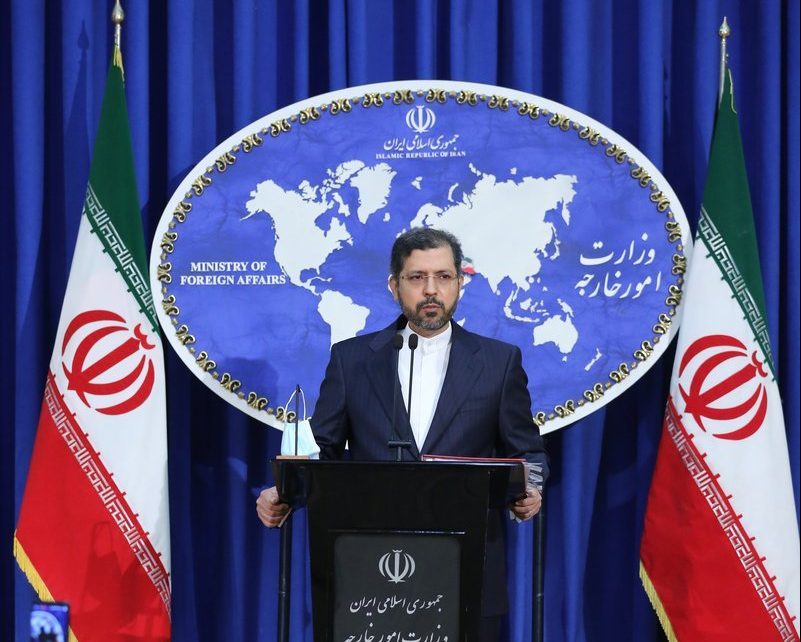The UN’s nuclear watchdog said Iran has started using advanced centrifuges at its Fordow site.
Iran accused Israel of “trumpeting lies to poison” the latest round of nuclear talks in Vienna following a report written by a Tel-Aviv based reporter claiming Tehran has ramped up its uranium enrichment.
“Israeli regime whose existence relies on tension is at it again, trumpeting lies to poison Vienna talks,” tweeted Iranian Foreign Ministry spokesman Saeed Khatibzadeh on Wednesday, without specifying the alleged lies made by Israel.
This came after a Tel Aviv-based reporter for Axios reported on Monday that Iran is taking technical steps to enriching uranium at 90%, which is the required level for developing a nuclear weapon.
The report cited intelligence shared by Israel over the past two weeks with the US and a number of European allies.
European diplomats say next 48 hours ‘critical’ for Iran nuclear talks
Those claims were dismissed by the head of the UN’s International Atomic Energy Agency [IAEA].
“There is no 90% enrichment at the moment in the Islamic Republic of Iran. You have enrichment at 5%, you have enrichment at 20%, you have enrichment of 60%…but we don’t have any information about 90% enrichment,” said Grossi in an interview with France 24.
Western powers have been calling on Iran to decrease its nuclear activity, especially after it proceeded to enrich uranium at 60% purity in response to a series of attacks while the first rounds of Vienna talks were taking place earlier this year.
Tehran blamed the assaults on Tel Aviv, citing its opposition to the restoration of the Joint Comprehensive Plan of Action [JCPOA] and keenness on maintaining economic sanctions on the Islamic Republic.
The indirect US-Iran talks initially started in the Austrian capital in April this year to revive the 2015 nuclear accord, but adjourned following the sixth round in June. The talks were put on hold as Iran’s elections took place, which saw the victory of Raisi.
Vienna talks start on ‘positive note’ as Iran pushes for lifting of sanctions
Diplomats returned to Vienna on Monday following months of delay.
“All parties in the room now face a test of their independence and political will to carry out the job— irrespective of the fake news designed to destroy prospects for success,” added Khatibzadeh, commenting on the recent round of talks.
IAEA concerns
Meanwhile, the IAEA claimed on Wednesday that Iran has started enriching uranium using advanced centrifuges at its Fordow Fuel Enrichment Plant [FFEP] despite the resumption of Vienna talks.
“This redoubles the alert. It is not banal. Iran can do it, but if you have such an ambition you need to accept inspections. It’s necessary,” IAEA Director General Rafael Grossi told France 24, expressing is concern over the latest development.
According to an IAEA report seen by Reuters, the nuclear watchdog said Iran started to enrich uranium up to 20% purity using one cascade made up of 166 advanced IR-6 centrifuges.
As a result, the IAEA is now planning to step up its inspections at the FFEP as Iran’s permanent mission to UN organisations in Vienna said the recent report was “an ordinary update in line with regular verification”.
On Thursday, Israeli Prime Minister Naftali Bennett called on world powers to immediately halt talks in response to the IAEA’s report.
“Iran is carrying out nuclear blackmail as a negotiating tactic, and this should be answered by the immediate halt to negotiations and the implementation of tough steps by the world powers,” said Bennett, as quoted by his office in a call with US Secretary of State Antony Blinken.
The IAEA has been raising particular concerns over the lack of access to cameras at the facility in Karaj that were damaged in June during an attack that Iran had blamed on Israel.
In a September deal between the Islamic Republic and the nuclear agency, Iran agreed to grant inspectors access to service monitoring equipment by replacing memory cards for relevant data needed.
Iran allowed the IAEA to access most of its cameras and replace their batteries as well as memory cards, except the ones at the damaged site.
In turn, Tehran has defended its decision to not grant the nuclear watchdog access to the Tesa Karaj facility saying an investigation over the sabotage remains ongoing.
Grossi previously noted that the lack of access is “seriously affecting the IAEA’s ability to restore continuity of knowledge at the workshop, which has been widely recognised as essential in relation to a return to the JCPOA”.
Despite the latest developments, Grossi believes that a deal is possible given that the discussions are not starting from scratch.
“They have been talking about several nuclear specific things including some technical matters and then there is a political discussion about the sanctions…but I can say that lots of elements are there and an agreement would be possible if of course they want to do it,” he said.
When former US President Donald Trump withdrew from the JCPOA in 2018, he imposed stifling economic sanctions on Iran in a bid to apply what his administration described as “maximum pressure” on Tehran.
This created a state of mistrust from the Iranian side, which is demanding guarantees from the US that it will not back out of the deal again.
Washington also previously warned it would pursue “other options” if Iran does not reduce its nuclear activity. It also vowed to exert pressure on Tehran if it accelerates its nuclear programme during the current talks.







